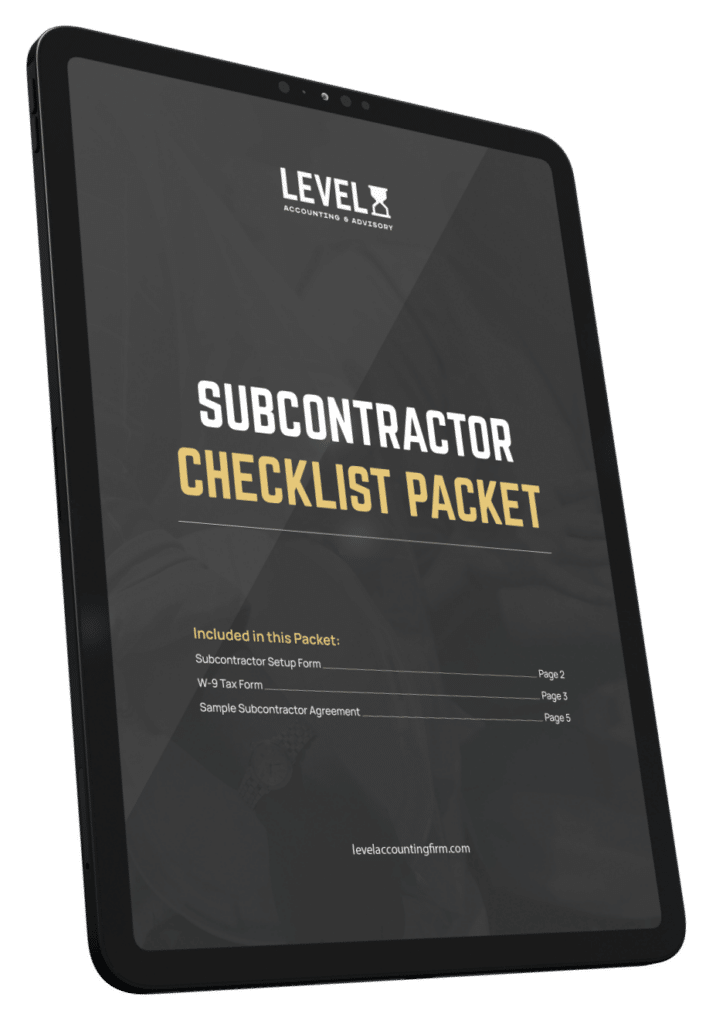As a contractor, your business faces unique tax challenges. But with the right strategies, you can maximize your tax deductions and keep more of your hard-earned money. Let’s dive into what a tax deduction is, the top 20 tax deductions for contractors, and how proper tax planning can save you thousands.
What is a Tax Deduction?
A tax deduction is an expense that you can subtract from your taxable income. Instead of paying income taxes on that money, it’s essentially excluded from your total income.
For example, let’s say your construction company had $500,000 in revenue last year, and $400,000 in business expenses. Your taxable income would be $100,000 ($500,000 revenue – $400,000 expenses). If your tax rate is 25%, you’d owe $25,000 in income taxes.
However, if you were able to claim an additional $50,000 in tax deductions, your taxable income would drop to $50,000. At a 25% tax rate, your tax bill would be just $12,500 – a savings of $12,500!
Tax deductions don’t just lower your tax bill – they also increase your cash flow. The more deductions you can claim, the more of your revenue you get to keep working for your business.
Top 20 Deductions for Construction Business Owners
As a contractor, there are a wide variety of expenses you can deduct. Here are 20 of the most common and valuable tax deductions for contractors:
- Vehicle Expenses: Whether you use your personal vehicle or company trucks, you can deduct a portion of your mileage, insurance, repairs, and other vehicle-related costs.
- Tools and Equipment: The cost of tools, machinery, computers, and other equipment used for your business is fully deductible.
- Office Supplies and Expenses: From pens and paper to software subscriptions, your everyday office expenses can be deducted.
- Professional Development: Courses, seminars, memberships, and other expenses related to improving your skills or knowledge are deductible.
- Business Insurance: Premiums for liability, worker’s compensation, and other types of business insurance are tax-deductible.
- Utilities: The cost of electricity, internet, phone, and other utilities for your business space can be deducted.
- Business Loans and Interest: Interest paid on business loans, lines of credit, and other financing is tax-deductible.
- Legal and Professional Fees: Expenses for lawyers, accountants, consultants, and other professionals who provide services to your business can be deducted.
- Advertising and Marketing: The cost of promoting your business through websites, business cards, advertising, and other marketing efforts is deductible.
- Charitable Contributions: Donations to qualified charitable organizations made on behalf of your business can be deducted.
- Employee Wages and Benefits: Salaries, payroll taxes, health insurance, retirement plan contributions, and other employee-related expenses are fully deductible.
- Rent and Mortgage Interest: If you rent or own commercial property for your business, the associated costs are tax-deductible.
- Depreciation: You can deduct a portion of the cost of major business assets, like vehicles, equipment, and real estate, over time.
- Safety Equipment: The expense of hard hats, safety goggles, work boots, and other required safety gear is deductible.
- Job Site Expenses: Costs for consumable materials, portable toilets, temporary fencing, and other job site-specific expenses are deductible.
- Business Travel: Flights, hotels, meals, and other costs associated with traveling for work purposes can be deducted.
- Self-Employment Tax: As a contractor, you can deduct half of the self-employment tax you pay.
- Home Office: If you use a portion of your home exclusively for your contracting business, you may be able to deduct a percentage of your utilities, insurance, and other home expenses.
- Bad Debts: If a client fails to pay you and you’ve exhausted all collection efforts, you can deduct the unpaid balance as a business loss.
- Energy Efficient Upgrades: Certain investments in energy-efficient equipment or property improvements may qualify for special tax credits or deductions.
PS – While you don’t need to bring your receipts in a shoebox to your accountants office if you have great bookkeeping, you should still keep all of your receipts. We like to use Dext to help our clients keep track of their receipts.
Deductions vs Tax Strategy

It’s important to note that simply finding every possible tax deduction for contractors is only one piece of effective tax strategy. True tax planning involves much more.
While deductions reduce your taxable income, tax planning looks at the bigger picture – evaluating your entire financial situation to determine the most tax-efficient way to structure your business, invest in equipment and property, time major purchases and expenses, and more.
A skilled tax planner will also help you take advantage of credits, exemptions, and other tax-saving opportunities beyond just deductions. They’ll customize a comprehensive plan to minimize your taxes year-round, not just at filing time.
Check out our guide: “3 Secret Tax Strategies for Contractors” for lesser known tax strategies that you may be able to take advantage of to save thousands in taxes.
Partner with a Tax Expert for Contractors
When it comes to maximizing tax deductions for contractors and minimizing taxes, the team at Level Accounting & Advisory is second to none. As a leading provider of accounting and tax services for construction businesses, we do more than just identify every eligible deduction.

We take a proactive, strategic approach to your taxes, developing a customized plan that aligns with your unique business goals. Our experts stay up-to-date on the latest tax laws and regulations, ensuring you take advantage of every opportunity to reduce your tax burden.
But our services go far beyond just tax planning and filing. We provide comprehensive, full-service accounting support – from monthly bookkeeping to financial reporting. This integrated approach allows us to truly understand your business and position you for long-term success.
If you’re ready to work with an accounting firm that treats your taxes as just one piece of a bigger financial strategy, contact Level Accounting & Advisory today. We’ll help you save money, reduce your stress, and invest in your business’s future.
Did this blog help you? Check out our other blogs below:
- 1099 vs W2: What Contractors Need to Know About Hiring
- BOI Reports: Your How To Guide to Filing
- Cash vs Accrual Accounting for Construction Businesses
- 1099s: Everything Contractors Need to Know
- Why Should Contractors Consider an S-Corp Election
- How to Pay Yourself as an S-Corp Owner
- More can be found Here
Disclaimer: This article provides general information and should not be construed as tax, legal, or accounting advice. Always consult qualified professionals for guidance specific to your situation.


